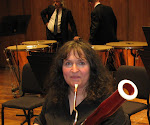 |
| Paul Judy |
One of the first points established by Mr. Judy is that over the past 15 years, there has been little change or innovation in the way orchestral organizations operate. I certainly agree. The Columbus Symphony has tweaked itself more than most orchestras have, and it's thanks to those changes that the orchestra is still in business. The Columbus Symphony is now managed by CAPA and the number of weeks in the season has been reduced. Yet the basic model remains in place, and the following quote from Mr. Judy describes my primary concern:
"While the need for greater community engagement and social value has mounted, it is discouraging to see how little has changed. Orchestra organizations have done little to redefine the community services they should be providing and, thus, there has been little modification of the job descriptions of all employees, but especially those of musicians."As I've stated in previous posts, I consider the orchestra's relevance to the community to be of tremendous importance.
Mr. Judy goes on to explain one of the major problems with the existing model:
"The ensemble of musicians— which is the very reason for the organization’s existence — is separated from and pitted economically and psychologically against governance — the management and board — and through them, against the organization’s audiences and contributors –and the local community at large"In Columbus we have done our utmost to overcome that phenomenon. The musicians and the union have gone to great lengths to work with (rather than against) our governance over the past two years, although admittedly, that is new behavior for us. I believe that our effort to cooperate is a huge part of the reason why the Columbus Symphony is still in business despite extreme financial distress.
What exactly does Mr. Judy propose as a solution to the problems evident within the current symphony model? (Warning: this is radical!) Here's step one:
"Firstly, the notion of a “symphony orchestra organization” needs to be tossed out and replaced by the concept of a “musical arts and services organization.” Such an entity would have a larger musician membership than a symphony orchestra, and its musicians would perform a wide range of classical and high-standard popular music. Among the activities would be symphony concerts performed in a central venue or venues. But more broadly and extensively, the organization would present a wide range of music in many smaller venues and settings throughout the community. It would serve broad and diverse audiences, and such performances would be coupled and integrated with music education."I can imagine that the "musical arts and services organization" concept might not appeal to musicians who already have "secure" full time orchestral jobs. But let's face it, the number of people in that category is diminishing, as orchestras fold and cut back! I wonder how many musicians in the U.S. actually feel confident that their jobs are secure.
Aspiring orchestral players in college are being educated in entrepreneurship and the importance of thinking outside the box in order to create a career in music. My guess is that those younger musicians would have no problem accepting the idea of the musical arts and services organization, with its extreme flexibility..
Perhaps this aspect of Mr. Judy's plan will appeal to all orchestral musicians, including those who are traditionally-oriented:
"Secondly, in another major departure from past practice, these new organizations must be musician-governed and musician-driven. By this, I mean the legal beneficial control of the organization through its organizing documents needs to rest with the musician membership. What’s more, the central board/executive committee functions, and particularly the artistic decision making (personnel and programming), need particularly to be led by musicians."It's been my experience that musicians often think that they are better-equipped to run an orchestra than those who are doing it, so here's our chance, if we choose to embrace Paul Judy's truly innovative model in which the musicians control the governance. In summary:
"We need to develop a new model for larger scale, musician-governed, diverse, and flexible musical arts and services societies. These entities would galvanize and liberate the creative potential of musician members, management and staff, and community participants. They would better serve audiences, donors, and the community at large. And they would provide economic sustenance for the musicians, who would have the primary and controlling stake in the success of the organization."What do you think? Can you imagine this model succeeding?
.
.






No comments:
Post a Comment